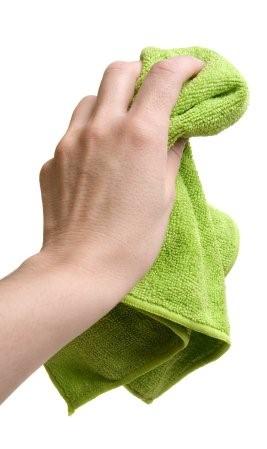Have a clean Spring: Add some green to your cleaning routine
 Now that spring is well underway and the weather is warmer, thoughts turn to freshening up your surroundings. Spring cleaning is a time-honored tradition, and can result in simplifying and organizing your home and/or office without impacting the environment by following some simple strategies.
Now that spring is well underway and the weather is warmer, thoughts turn to freshening up your surroundings. Spring cleaning is a time-honored tradition, and can result in simplifying and organizing your home and/or office without impacting the environment by following some simple strategies.
“Spring cleaning is a great time to think about your environmental impact and strategies,” said Kendra Abkowitz of the Vanderbilt University Sustainability and Environmental Management Office. “Start a recycling program, switch to a greener cleaner or donate gently used items to a charitable organization.”
- Use old T-shirts, sheets and other clothing items as dusting and cleaning rags or sponges and cloth towels made of natural fibers instead of paper towels. You can even wash and reuse them several times. If you must use paper towels, try using those that are processed chlorine-free (PCF) and contain high levels of post-consumer recycled content. Check out the National Resources Defense Council’s Shoppers Guide to Home Tissue Products for more information on specific products meeting these criteria.
Vanderbilt sources a great deal of post-consumer recycled content paper products, such as Georgia Pacific’s Envision paper towels containing 100 percent recycled content with a minimum of 50 percent post-consumer recycled content. Garbage bags used on campus also contain post-consumer recycled content.
- Consider using less-toxic and more environmentally-friendly cleaning products, such as those that have received Green Seal Certification and those available from Seventh Generation, Mrs. Meyer’s, Method or Clorox Green Works, many of which can be purchased at common retailers including Target, Walmart and Kroger.
You can even make your own cleaners using household items such as baking soda, lemon juice, vinegar, and club soda. Visit Care2’s How to Make Your Own Non-Toxic Cleaning Kit for more information. In most cases, environmentally-friendly cleaners work just as well as their commercial counterparts.
The majority of cleaners used by Vanderbilt Plant Operations on campus are Green Seal Certified and dispensed from concentrated bulk jugs into reusable containers to save waste and environmental impacts from transportation.
- Reduce some of the clutter in your life through re-using and recycling. List usable items that you no longer want on Vandy FreeSwap, a website for Vanderbilt students, faculty and staff who want to give away or get free, usable, unwanted items instead of disposing of them in landfills, or the Vanderbilt Classifieds if you prefer to sell the item.
Students are encouraged to participate in Vanderbilt’s Earth Friendly Move-Out. Unwanted items, such as clothing, linens, futons, small chairs, bedding, mini-fridges, microwaves, lamps, televisions, computers, books and clothing, may be donated to local nonprofits, including ARC of Davidson County, Our Thrift Store, Graceworks Ministries, Thrift Smart, World Relief, Goodwill, Boys & Girls Club, and Mending Hearts, at donation centers that will be established throughout campus from April 28 – May 14. For more information, contact Lindsay Walker at lindsay.walker@vanderbilt.edu or 615.343.7781.
Don’t forget to dispose of hazardous materials properly. Campus and Medical Center departments can find instructions for recycling Vanderbilt-owned or generated computers and electronics on SustainVU’s Computers & Electronics Recycling Page and chemicals and paint on VEHS’ Hazardous Waste Disposal Page. Household hazardous waste (HHW) information for residents in Davidson Country can be found on the Metro Public Works HHW Page. Non-Davidson County residents should contact their county’s solid waste department for further instructions or consult the Tennessee Department of Environment and Conservation’s HHW website.
Visit SustainVU’s Recycling Page for more information on recycling programs available on campus and in the Medical Center and the Metro Public Works Recycling Page for more information on recycling in the Nashville community. Recycling information outside of Nashville and in any community can be found at Earth911.
Other quick tips:
- Go paperless and enroll in online banking and billing, subscribe to newsletters and magazines electronically, utilize e-books and print out fewer items. Visit SustainVU’s Paper Reduction Page for a more extensive list of ideas for reducing the amount of paper you generate and consume at home and in the office.
- Only buy what you need, opt for items that are reusable rather than single-use or disposable, or consider renting or sharing infrequently used products, such as checking out books and other resources through VU Libraries.
- Naturally clean indoor air by obtaining houseplants, such as Boston ferns, English ivy, rubber plants and peace lilies, which help to clean the air.
- Use a natural alternative to mothballs by wrapping cinnamon sticks, bay leaves, or whole cloves in cheesecloth.
For more information about Vanderbilt’s sustainability program, visit the SustainVU website, become a fan of SEMO’s SustainVU Facebook page, or contact VU’s Sustainability and Environmental Management Office at SustainVU@vanderbilt.edu.

Leave a Response